Life Lessons from . . . Shaving
 Remember those posters they used to sell? The one’s with the headline “Everything I know about life I learned from . . .”
Remember those posters they used to sell? The one’s with the headline “Everything I know about life I learned from . . .”
Then inserted after the ellipse was something like ” . . . Kindergarten,” or ” . . . my cat.” Well, this morning it occurred to me that there are life lessons in many things, although I rarely see them. Much like these posters tell us, there’s much to be learned in life’s day to day. This morning I took lessons from something I do (almost) every morning, shaving. The following are my less than scholarly observations.
Life Lessons From Shaving:
1. Going against the grain can be tricky, but necessary.
I get so frustrated when these “how to” bloggers and old fashioned barbers try to tell me that to achieve the best shave, you must shave WITH the direction of your hair. Going against the grain, they say, causes irritation, thus impeding the blade from making solid contact with your skin.
So why is it that every time I shave WITH the grain, I spend the day nervously scratching the 12 patches of stubble this perfect shaving technique left behind?
So I draw this conclusion:
Sometimes in life, it is necessary to go against the grain to get the job done. HOWEVER, one will almost invariably have better results by FIRST going with the grain, then take the opposing course of action only when necessary.
2. Timing is everything.
Perhaps at the infantile age of 32 I’m still hovering in the final stages of some tragically prolonged puberty purgatory. This would explain why after one day of growth, my beard still isn’t quite long enough to provide a clean shave. Shaving on the second day gives my face a much better opportunity to offer up a more substancial sacrifice to the beard buddah. Of course, I can’t always wait to shave every other day. This means that sometimes, I just have to deal with it.
So I draw this conclusion:
Probelm solving isn’t always an instant process. Sometimes a problem needs to be allowed to fully expose itself before it can be dealt with correctly. However, that doesn’t change the fact that other times you just have to do what you have to do.
3. A little heat never hurt anyone.
Ever tried to shave when it was cold? Enough said.
So I draw this conclusion:
When life heats up, smile. We often do our best work in this environment.
4. Smoke and mirrors are a part of life.
I decided long ago to shave not before, not after, but during a shower. It’s easier, quicker, and the results are just better. However, this decision led me to a profound consumer realization. There is no such thing as a fogless mirror! It’s a constant battle I face (no pun intended) – trying to focus through the haze of morning on a blurry image in a foggy mirror while I rake a sharp blade across my throat.
So I draw this conclusion:
Very few things are as they seem. So much of what we do, from the mudain and ordinary to the extreme and perilous, requires us to make decisions based on information that is far too often clouded by the smoke and mirrors of the world. Don’t believe me? Watch the news.
5. Some problems never go away, we just get better at dealing with them.
You know what’s funny? Nearly everyday of my adult life I shave. Then I go to work, come home, go to bed, wake up, and . . . dadgummit! I have to shave all over again. This is a viscious cycle that I frankly can’t believe we haven’t found a way to break yet. But alas, we have not. And so . . . I shave. I am, therefore I shave. But I’m a lot better at it than I used to be.
So I draw this FINAL conclusion:
Try as we might, there are some problems we will never “fix.” When it comes to these things, perhaps “fixing” isn’t the goal, but rather what we become in the process.
So . . . did I miss anything? Share your comments and add to the list!

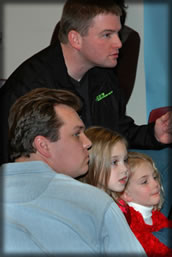 Whether it’s paying the bills or keeping the house, taking out the trash or changing the oil, these things matter. Renewing your car tags, saving for a rainy day, taking care of your own parents, and voting are all ways to be a parent. These are things that will likely go unnoticed unless they go undone.
Whether it’s paying the bills or keeping the house, taking out the trash or changing the oil, these things matter. Renewing your car tags, saving for a rainy day, taking care of your own parents, and voting are all ways to be a parent. These are things that will likely go unnoticed unless they go undone. When I was younger, I wrote love letters. They began simply enough with “check-yes-or-no” messages to one girl or another. Over time they evolved into sappy pieces of sentimentality that won the hearts of some, scared away a few others, and drew the attention of more than one concerned father.
When I was younger, I wrote love letters. They began simply enough with “check-yes-or-no” messages to one girl or another. Over time they evolved into sappy pieces of sentimentality that won the hearts of some, scared away a few others, and drew the attention of more than one concerned father.
 If you’ve read this blog at all, you know that I have children. Three of them. All smarter than me. Even the one who still spits up and poops his pants. I don’t deny this. But now they’ve gone too far. If I am to believe them, the smart ones, then God is now relaying messages for me through them. Not in the grab-your-heart-that’s-so-profound kind of way. I’m talking about real conversations between God and my children, all apparently meant for my benefit.
If you’ve read this blog at all, you know that I have children. Three of them. All smarter than me. Even the one who still spits up and poops his pants. I don’t deny this. But now they’ve gone too far. If I am to believe them, the smart ones, then God is now relaying messages for me through them. Not in the grab-your-heart-that’s-so-profound kind of way. I’m talking about real conversations between God and my children, all apparently meant for my benefit. My kids . . . what can I say? They’re prodigies. Here you see my four year old is already trying her hand at Halloween cinematography. Sure it’s been done. But I must say, she’s hitting 11 on the scary meter with this one.
My kids . . . what can I say? They’re prodigies. Here you see my four year old is already trying her hand at Halloween cinematography. Sure it’s been done. But I must say, she’s hitting 11 on the scary meter with this one. I saw this in my children for the first time this year. And I don’t know how I could have missed it. My oldest, McKenzie, is . . . well, the oldest. She’s predictably over-achieving and strives for perfection in all she does. So what does she choose for her costume? A Geisha. Now, I know what you’re thinking. I thought it to. ‘What? My daughter is going trick our treating as an 18th Century Japanese prostitute?’ But let’s move passed this for a moment. To my daughter (who I sincerely hope has yet to define the word’prostitute’) this costume is something entirely different. To her there is only beauty, mystery, and perfection. This is who she is, who she wants to be. And I love that about her.
I saw this in my children for the first time this year. And I don’t know how I could have missed it. My oldest, McKenzie, is . . . well, the oldest. She’s predictably over-achieving and strives for perfection in all she does. So what does she choose for her costume? A Geisha. Now, I know what you’re thinking. I thought it to. ‘What? My daughter is going trick our treating as an 18th Century Japanese prostitute?’ But let’s move passed this for a moment. To my daughter (who I sincerely hope has yet to define the word’prostitute’) this costume is something entirely different. To her there is only beauty, mystery, and perfection. This is who she is, who she wants to be. And I love that about her.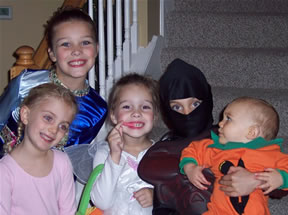 Our friends joined us. Their costumes were equally telling. McKenzie’s counterpart, the Ninja formerly known as Brad, was telling all with those eyes of his. Deadly, yet adorable. Here’s a kid that has the brain power to take over the world, but the temperament to give it all back to whoever needs it. I was proud to have an ancient warrior to escort my little Japanese . . . uh . . . lady. Then there was Bailey. Another princess. Again, no explanation needed.
Our friends joined us. Their costumes were equally telling. McKenzie’s counterpart, the Ninja formerly known as Brad, was telling all with those eyes of his. Deadly, yet adorable. Here’s a kid that has the brain power to take over the world, but the temperament to give it all back to whoever needs it. I was proud to have an ancient warrior to escort my little Japanese . . . uh . . . lady. Then there was Bailey. Another princess. Again, no explanation needed.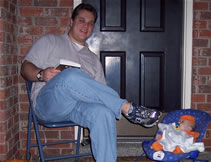 Next year I will take note. While there are many who will wimp out with the traditional one-eyeball-hanging-out rubber mask and Daddy’s old overalls, I’m betting that there are a few whos’ masks will do more revealing than concealing. I’ll also be watching to see what masks my children and their friends adorn. What will those masks say about them? Time will tell. Until then, it’s just me on the porch eating Candy Corn. Yum yum.
Next year I will take note. While there are many who will wimp out with the traditional one-eyeball-hanging-out rubber mask and Daddy’s old overalls, I’m betting that there are a few whos’ masks will do more revealing than concealing. I’ll also be watching to see what masks my children and their friends adorn. What will those masks say about them? Time will tell. Until then, it’s just me on the porch eating Candy Corn. Yum yum.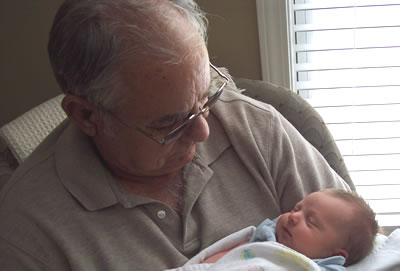
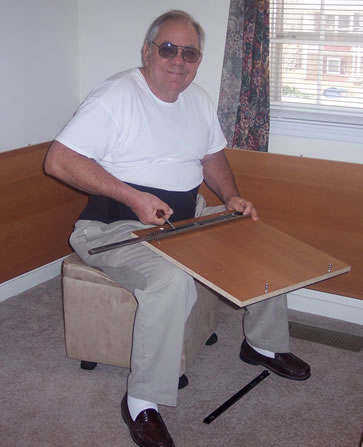
 My children have a way of focusing in on reality. Beyond the drama and all the . . . well . . . pink, both of my girls have this innate ability to see past the trappings of adulthood and unearth the raw truth behind the things my wife and I have already begun to take for granted.
My children have a way of focusing in on reality. Beyond the drama and all the . . . well . . . pink, both of my girls have this innate ability to see past the trappings of adulthood and unearth the raw truth behind the things my wife and I have already begun to take for granted. Surprised but slightly amused by the show of spontaneous and rather anonymous affection, the bride kindly returns the hug only to hear my daughter ask the most probing, thought-provoking, socially conscious question one could expect at a time like this, “Could I see your shoes?”
Surprised but slightly amused by the show of spontaneous and rather anonymous affection, the bride kindly returns the hug only to hear my daughter ask the most probing, thought-provoking, socially conscious question one could expect at a time like this, “Could I see your shoes?”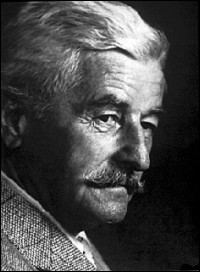 I read Faulkner’s As I Lay Dying in high school. I even wrote a literary critique on the book. Of course I merely compiled and reconstructed the thoughts of other noted scholars on the subject. This earned me an “A,” and so I was happy. The End.
I read Faulkner’s As I Lay Dying in high school. I even wrote a literary critique on the book. Of course I merely compiled and reconstructed the thoughts of other noted scholars on the subject. This earned me an “A,” and so I was happy. The End. My next project, Light in August. First let me say that this selection was solely predicated on the availability of audiobooks through my library’s online lending system. I
My next project, Light in August. First let me say that this selection was solely predicated on the availability of audiobooks through my library’s online lending system. I